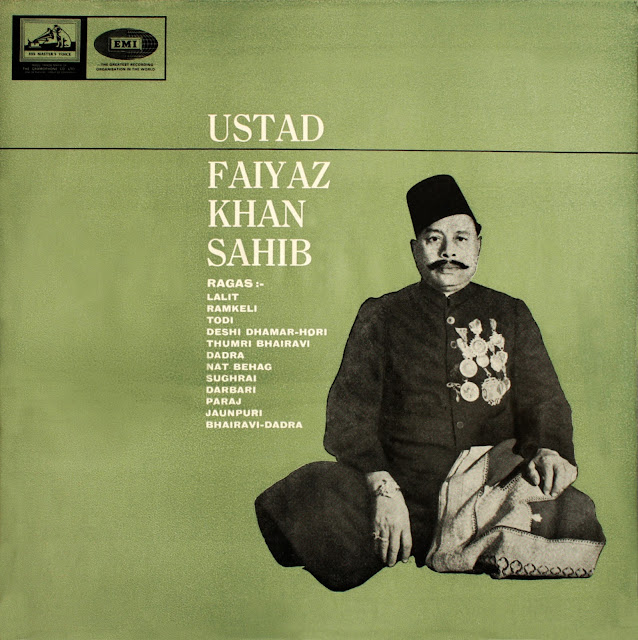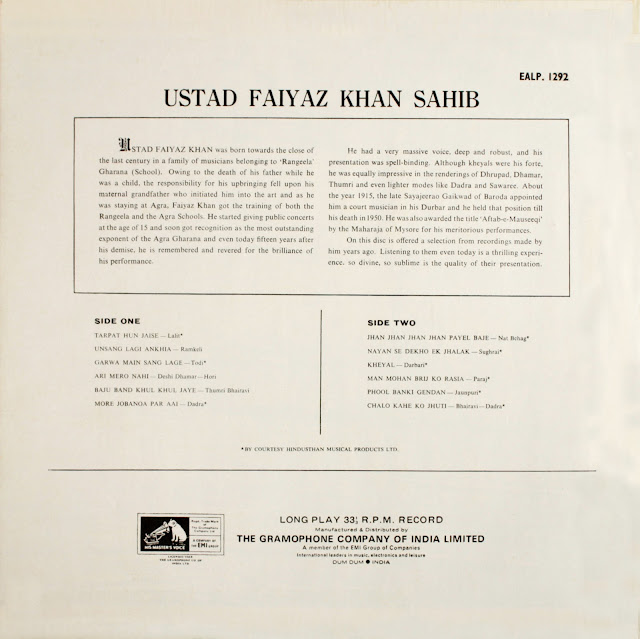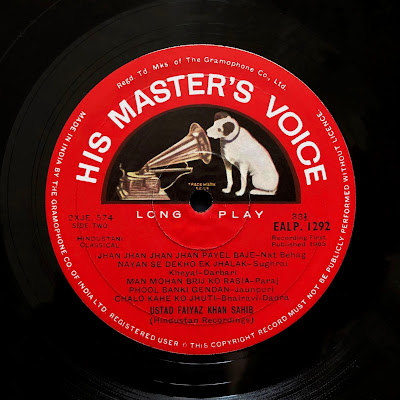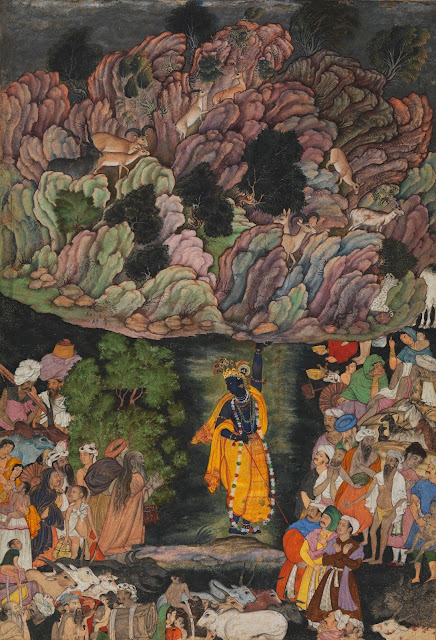INDIA – INDE
Ustad Faiyaz Khan Sahib – His Master’s Voice – EALP 1292, released 1965 (LP)
The Agra Gharana vocalist Ustad Faiyaz Khan (1886-1950) was a towering Hindustani artist of the 20th century. Born into a family of distinguished musicians in Sikandra, Agra, his father, Safdar Hussain Khan, died before he was born, so his grandfather, Ghulam Abbas Khan, and granduncle, Kallan Khan, supervised his musical upbringing. Khan was also much influenced by Zohrabai (1868-1913), another Agra Gharana singer, and greatly admired Abdul Karim Khan (1872-1937), the founder of Kirana Gharana.
Faiyaz Khan served as a court musician in Baroda, but also performed publicly in Bombay, Delhi, Lucknow and Calcutta, most notably at the All Bengal Music Conference launched in 1934. All India Radio broadcast his music throughout the country.
A true musical phenomenon, Faiyaz Khan expressed his incomparable versatility, brilliance and majesty in the Khayal style, as well as in the Dhrupad, Dhamar and Thumri styles.
According to Susheela Misra, author of Great Masters of Hindustani Music (1981): "As one of the privileged few in whose home the Aftab-e-Mausiqui [the Sun of Music] gave several informal all-night music soirees, I am at a loss for words when I try to describe the spellbinding effect of his voice: rich, masculine, sonorous, trembling with emotion, a voice capable of a thousand nuances and shades, moods and fancies, turns and twists that touched the very chords of the listeners' hearts. His voice was at its grandest in the mandra [lower] notes. Its range was not wide, in fact, it was quite limited in the taar saptak [higher octaves], but in his two or two and a half octave range he created 'a living picture of the raga, pulsating with life and personality.’"
Khan was also a prolific composer and great teacher, whose illustrious disciples included Vilayat Hussain Khan (1895–1962), Khadim Hussain Khan (1907–1993), Shrikrishna Narayan Ratanjankar (1900–1974), Latafat Hussain Khan (1920–1986), Dilip Chandra Vedi (1901–1992), Ata Hussain Khan (1899–1980), and Sharafat Hussain Khan (1930–1985).
Le chanteur d'Agra Gharana Ustad Faiyaz Khan (1886-1950) fut l'une des figures majeures de la musique Hindoustani du XXe siècle. Né dans une famille de grands musiciens à Sikandra, Agra, son père, Safdar Hussain Khan, meurt avant sa naissance, et son éducation musicale fut prodiguée par son grand-père, Ghulam Abbas Khan, et son grand-oncle, Kallan Khan. Faiyaz Khan fut également très influencé par la chanteuse d’Agra Gharana Zohrabai (1868-1913) et exprimait une grande admiration pour Abdul Karim Khan (1872-1937), le fondateur du Kirana Gharana.
Faiyaz Khan s’établit comme musicien de cour à Baroda, tout en donnant des récitals à Bombay, Delhi, Lucknow et Calcutta, notamment lors du All Bengal Music Conference crée en 1934. All India Radio diffusait également sa musique sur tout le territoire lui assurant une renommée nationale.
Véritable phénomène musical, Faiyaz Khan exprima toute l’étendue de sa puissante fluidité, sa brillance et sa majesté incomparables dans le Khayal, mais également dans le Dhrupad, le Dhamar et le Thumri.
Selon Susheela Misra, auteure de Great Masters of Hindustani Music (1981): « En tant que l'une des rares personnes privilégiées chez qui l'Aftab-e-Mausiqui [le Soleil de la musique] a animé plusieurs longues soirées musicales informelles nocturnes, je trouve difficilement les mots pour décrire l'effet envoûtant de sa voix: riche, masculine, sonore, vibrant d'émotion, une voix capable d’une myriade de couleurs et de nuances, des atmosphères et un univers onirique sophistiqués, et des rebondissements inattendus qui allaient droit au cœur des auditeurs. Sa voix atteint la plénitude dans les notes mandra [basses]. Sa tessiture de voix était en fait limitée dans le taar saptak [octaves supérieurs], mais dans ce registre de deux octaves et demi, il créa une image vivante du raga, débordant de vie et de personnalité. »
Khan fut également un compositeur prolifique et un grand guru qui forma d’illustres disciples tels Vilayat Hussain Khan (1895–1962), Khadim Hussain Khan (1907–1993), Shrikrishna Narayan Ratanjankar (1900–1974), Latafat Hussain Khan (1920–1986), Dilip Chandra Vedi (1901–1992), Ata Hussain Khan (1899–1980) et Sharafat Hussain Khan (1930–1985).
A1 – Tarpat Hun Jaise - Lalit
A2 – Unsang Lagi Ankhia (Comp. Self) - Ramkeli
A3 – Garwa Main Sang Lage - Todi
A4 – Ari Mero Nahi - Deshi Dhamar-Hori
A5 – Baju Band Khul Khul Jaye - Thumri Bhairavi
A6 – More Jobanoa Par Aai - Dadra
B1 – Jhan Jhan Jhan Jhan Payel Baje - Nat Behag
B2 – Nayan Se Dekho Ek Jhalak - Sughrai
B3 – Kheyal-Darbari
B4 – Man Mohan Brij Ko Rasia - Paraj
B5 – Phool Banki Gendan - Jaunpuri
B6 – Chalo Kahe Ko Jhuti - Bhairavi-Dadra
Our other Faiyaz Khan post:
Faiyaz Khan – Hindustan Record LH5 (7 in, 45 RPM) here
The photograph below is from The Metropolitan Museum of Art's Open Access initiative, which gives access to more than 400,000 images of public-domain artworks from The Met collection available for free and unrestricted use (www.metmuseum.org):
Krishna Holds Up Mount Govardhan to Shelter the Villagers of Braj, Folio from a Harivamsa (The Legend of Hari (Krishna)), Mughal, c. 1590–95
"The Hindu epics the Mahabharata and the Ramayana, and other texts such as the Harivamsa, a genealogy of Hari (or Krishna), were translated into Persian and illustrated for the first time during Akbar’s reign (1556–1605). Unlike other manuscript projects for which the Mughal court artists inherited a tradition of iconography and style from earlier Iranian manuscripts, they had to invent new compositions for these works. The present folio depicts Krishna holding up Mount Govardhan to protect the villagers of Braj from the rains sent by the god Indra."
Please help me purchase
important traditional records to pursue my global
curation project and share the best finds with you on this blog:





Thank you so much for all your beautiful music presented overhere!!! I´m truly grateful and i am gonna donate you some because these sounds are just what I was looking for... Cheers!!
ReplyDeletenot download possible snif snif
ReplyDeleteThe downloads work fine. Either try using another browser or download a free software to decompress the downloaded files. Good luck
Delete